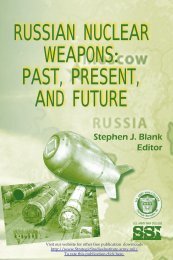The United States and China in Power Transition - Strategic Studies ...
The United States and China in Power Transition - Strategic Studies ...
The United States and China in Power Transition - Strategic Studies ...
Create successful ePaper yourself
Turn your PDF publications into a flip-book with our unique Google optimized e-Paper software.
Second, the <strong>United</strong> <strong>States</strong> will have strong resilience<br />
to stay on top. Even when <strong>Ch<strong>in</strong>a</strong> reaches its full<br />
potential <strong>and</strong> becomes a much more powerful nation,<br />
the <strong>United</strong> <strong>States</strong> will still be too big to be No. 2 to<br />
<strong>Ch<strong>in</strong>a</strong>. 23 A U.K.-like change <strong>in</strong> the U.S.-<strong>Ch<strong>in</strong>a</strong> relationship<br />
is very unlikely. <strong>The</strong> UK is much smaller than<br />
the <strong>United</strong> <strong>States</strong>. Its hegemonic reach was historically<br />
conditioned. As Organski notes, ord<strong>in</strong>arily, the UK<br />
would have no chance to rule the world, but as the<br />
first nation to become <strong>in</strong>dustrialized, the UK was able<br />
to become a global hegemon while much of the world<br />
was still <strong>in</strong> the underdeveloped agrarian stage. When<br />
the <strong>United</strong> <strong>States</strong> became the hegemonic power, the<br />
UK had no choice but to take a subord<strong>in</strong>ate role. This<br />
is not the case between the <strong>United</strong> <strong>States</strong> <strong>and</strong> <strong>Ch<strong>in</strong>a</strong>.<br />
Reluctant Accommodations?<br />
This is a very peculiar aspect of the U.S.-<strong>Ch<strong>in</strong>a</strong><br />
power transition. Other matters aside, the <strong>United</strong><br />
<strong>States</strong> <strong>and</strong> <strong>Ch<strong>in</strong>a</strong> both believe that some key changes<br />
<strong>in</strong> the other will make the transition, <strong>and</strong> the world<br />
for that matter, a peaceful one. For the <strong>United</strong> <strong>States</strong>,<br />
the most desirable change <strong>in</strong> <strong>Ch<strong>in</strong>a</strong> is for its government<br />
to become a democratic <strong>in</strong>stitution. For <strong>Ch<strong>in</strong>a</strong>,<br />
it is a curtailment of U.S. hegemonic conduct <strong>in</strong> <strong>in</strong>ternational<br />
politics <strong>and</strong> the democratization of <strong>in</strong>ternational<br />
relations. It is quite ironic that the “champion of<br />
democracy (i.e., the <strong>United</strong> <strong>States</strong>)” is accused of practic<strong>in</strong>g<br />
“dictatorship” <strong>in</strong> <strong>in</strong>ternational affairs whereas<br />
an authoritarian <strong>Ch<strong>in</strong>a</strong> promotes democracy <strong>in</strong> the<br />
world. 24 This irony, however, is surely the miss<strong>in</strong>g<br />
l<strong>in</strong>k between the <strong>United</strong> <strong>States</strong> <strong>and</strong> <strong>Ch<strong>in</strong>a</strong>, the peaceful<br />
evolution of which can make the U.S.-<strong>Ch<strong>in</strong>a</strong> power<br />
transition a different one <strong>in</strong> history.<br />
86

















